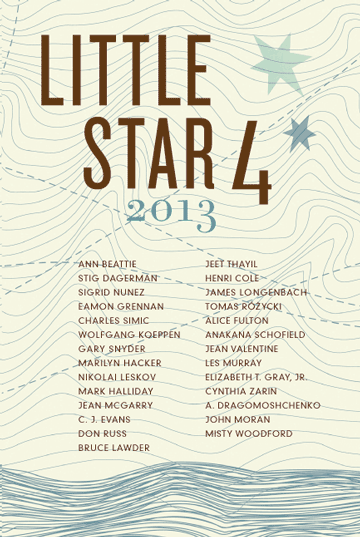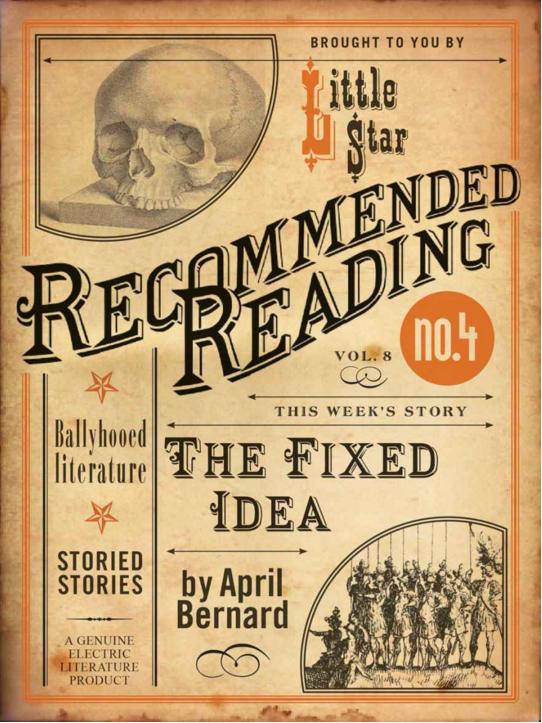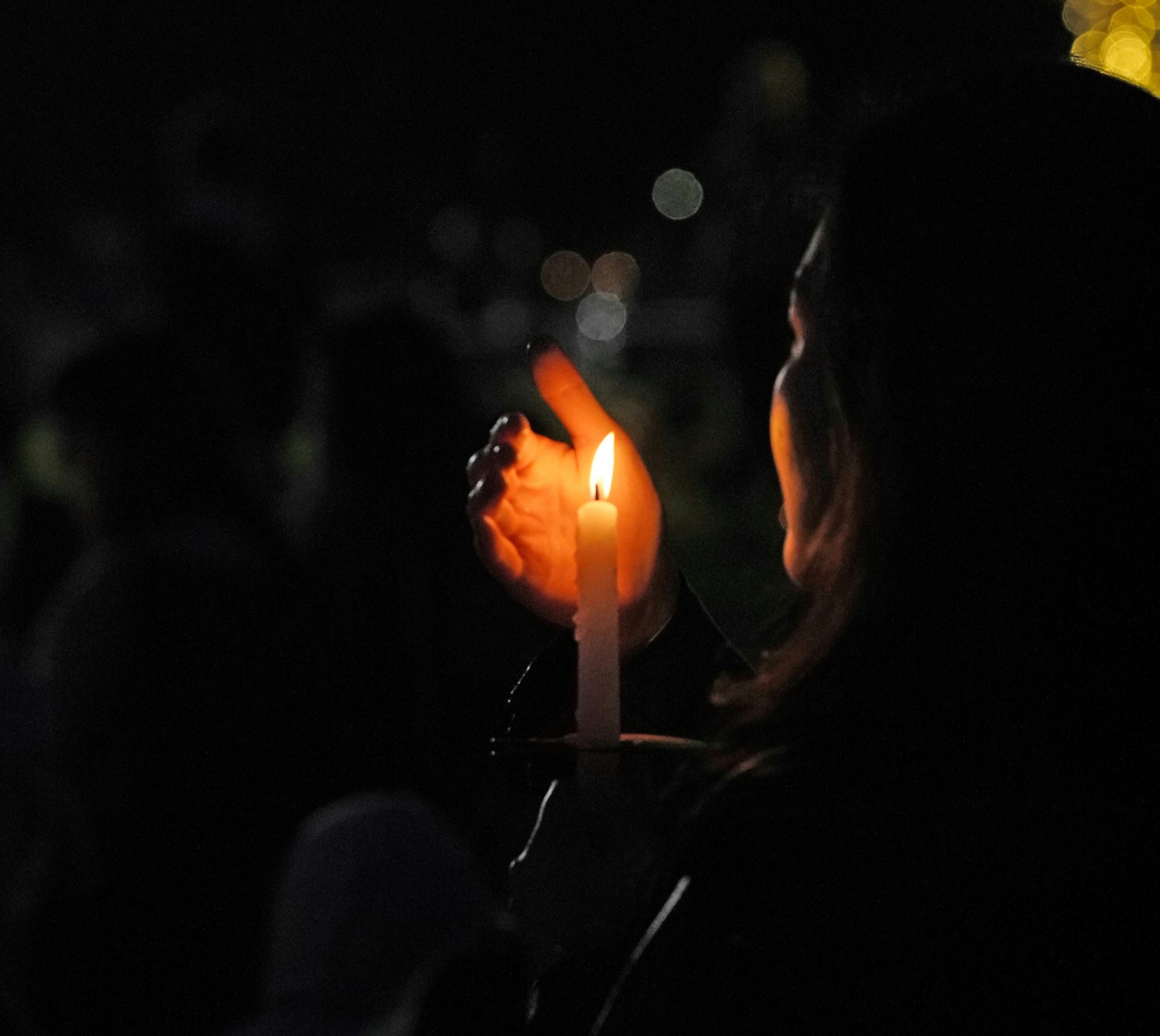Lit Mags
The Fixed Idea
by April Bernard, recommended by Little Star

EDITOR’S NOTE by Ann Kjellberg

April Bernard is a big-game hunter of voices. She stalks them through the underbrush and then lies in wait for them, sometimes for years. In her recent novel Miss Fuller (a portion here in Little Star online), about nineteenth-century troublemaker Margaret Fuller, she wrote her way all around Fuller’s entourage (which included the Thoreaus, the Hawthornes, the Emersons), finally inventing a sister for Henry David Thoreau in order to find the ear to hear Fuller herself. Once she had Anne, Margaret became audible, in the form of an invented letter found in the shipwreck in which she died, retelling the story of her final break from all that would protect her.
For “The Fixed Idea,” Bernard says, she first heard the character who became Alvin Lightman, the only-slightly-successful butter-knife-wielding actor who is its co-star, without knowing where to put him. Finally, by institutionalizing in a pastoral Northeast asylum both her character and his auditor, a bleakly funny writer-on-the mend who could look and sound a lot like April Bernard, he became audible to her and, fortunately, to us. Our Aprilish narrator manages to put herself back together by ricocheting her own language off Alvin’s crystalline personality, her fragile health perversely constructed around his actual, in the end, craziness. For both Alvin and the narrator and, one suspects, their creator, wit is either a riptide or a life-preserver, and one is never quite sure which.
As a poet April Bernard has also been an impresario of personalities, lightly parrying what Abigail Deutsch in an essay in n+1 called “the inconveniences of identity.” In her only (so far) novel, Pirate Jenny, Bernard’s heroine recasts herself as a stowaway in prosperous New York and tries on various costumes and personae in order to board its different worlds, taking them by stealth and cunning. In her razor-sharp reviews Bernard has often skewered sentimentalities and opened the window on bracing winds of criticism, distrusting, for example, memorialized writers’ houses and monumentalized poets’ ephemera.
It’s such a relief, as a reader, to be in the hands of a writer of such swashbuckling confidence and playfulness. I’m truly happy to have this chance to send “The Fixed Idea” forth into other orbits of readers and hope they’ll fly home to find all Bernard’s work.
Ann Kjellberg
Editor, Little Star
The Fixed Idea
April Bernard
Share article
ALVIN LIGHTMAN’S LIFE FIRST TOUCHED MINE when both of us were staying at Holdon House Facility upstate. Formerly it was Holdon Hospital, before that Holdon Asylum, and called variously by those who have worked and lived there, among other witticisms, Hold It, The Hold, and Hold On I’m Coming.
That I had “committed myself” was a distinction that became meaningless within moments of my arrival. (I had not written anything in three years; eight months earlier I had lost a newborn child, to death; and shortly thereafter a nonhusband, with whom I had lived for a dozen years, to the winds.) I felt cold all over all the time, even in the heat of July, even in the heat rising in silken ripples off the asphalt drive up to Holdon House. I emerged shivering from my taxi and tugged on my luggage. Weak and petulant as well as chilled to the bone, I gave way to babyish whimpers and was glad to let the attendants carry my things up the shallow steps.
Alvin Lightman, though I did not yet know his name, was sitting in the front parlor, designated the “lounge,” his long legs stretched out across a wicker ottoman. As he later told me, he watched my arrival circumspectly, from behind the traditional screen of an open newspaper. He thought I looked “ghastly” but “possibly interesting.”
Plenty of people have suffered worse than I; I knew it but the knowledge did not rouse me from my chilly and haphazard torpor, my thoughts that alit and then slid away from ideas, or names for things, or images. It was difficult to focus on the kindly man, not wearing white thank goodness, who showed me to my room, speaking gently and moving smoothly, as might an expert with wild animals. In my small private room, whose window looked out on a broad sloping lawn interrupted by tall pines, the attendant helped me unpack — that is, he relieved me of my laptop and cell phone and explained that Holdon was firm about these things. Supervised email once a week for each patient; no cell phones; no TV.
Television deprivation might be serious. Recently it had become necessary for me to sit in front of the television set with my eyes averted from the screen, and to sit in this posture for most of the day. Once in a while, I would slide my eyes back to the dazzling pixilated world of cars and pets and investment strategies; of carefully dressed women turned sideways in their chairs to ask slightly younger and more beautiful women about their movie roles; of Rice-A-Roni, which apparently people still ate somewhere; of soothingly incomprehensible yet ostensibly tense discussions between characters from old television shows, cops and doctors and cop-doctors and hookers and dealers and hooker-dealers. For an entire week, a channel that claims to air programs “for women” aired a “reality” series called “Snapped! Women Who Lose It.” Wonderful stories, I thought, if only I could have followed them. Hookers and girlfriends and hooker-girlfriends and wives and serial killers and serial killer-wives. I think there was also a wife-hooker-mother who forged checks.
I suspected, during occasional lucid moments, that there was a poem or story in there. People I don’t know well often say to me — “Sarah, you should write about that.” Usually it’s about them, but sometimes it’s about something horrible in the news. The father in Mount Vernon who was pimping his high-school daughter and her friends. The young woman in Staten Island who had been making “outsider art” out of bones from the local graveyard. The Park Avenue lawyer who coerced his wife into helping him starve and beat their adopted children to death.
I settled in at Holdon House, adjusting with a kind of blank relief to the enforced boredom. Gradually I rediscovered the attention span to read — there were at least a dozen Trollope novels in the library — and took walks about the grounds. I met with Dr. G twice a day. I agreed to write in a journal on the condition no one called that activity “journaling.” I wrote extensively about my wish to be dead, which was illogically, but apparently not uncommonly, unaccompanied by any wish actually to do myself in. I continued to grieve — on consideration, I know that is the right word — for my dead child, whose heart was bad and who had died in surgery within hours of her birth. I tried to be articulate about the loss of Jerry, who had packed and gone to Sri Lanka almost as soon as our baby had died. I hated him, that was about as articulate as I got. Jerry was a bass player who made his living as a physician’s assistant — you know, better than a nurse, not quite a doctor. While I was pregnant, without telling me, he had signed up with Doctors without Borders — hence the trip to Sri Lanka, where presumably he was vaccinating hundreds of thin children and their grateful mothers, thus lending a noble cast to his desertion.
Dr. G had me on a minimal amount of meds — just enough, he said, to take the edge off. So dully my days gnawed at me, and for the most part I avoided the other patients.
Alvin Lightman changed that. We exchanged a few gnomic sighs at meals, and I felt as if he were someone I already knew — of course, I did, as I had seen him often enough on TV. He’s a slightly-well-known actor, somewhere around sixty, tall and patrician, silver-haired, with a great voice, the kind that used to be called “plummy.” When they wanted a white male judge for the courtroom scenes on “Law & Order,” they got Alvin.
One day, a couple of weeks into my stay, I was trying to write in my journal while sitting directly in front of the air conditioner in the lounge. My body temperature had returned to normal, if nothing else in me had, and so I now was able fully to feel the terrible summer heat; I leaned into the vent, pressing my forehead to the plastic slats, curled over the notebook in my lap, writing with a particularly pleasing ballpoint pen that skated over the page. Alvin came into the room and loudly told me to quit hogging the breeze. He said it with a smile in his voice; it was the first normal-sounding sentence I had heard in a long time.
I hugged the vent closer, pretending at first not to let him share, then moved aside as he backed up to the window. We looked into one another’s faces — he had humorous creases about his mouth and his large grey eyes, and was obviously completely sane.
“What are you in for?” I asked, breaking a rule. We were supposed to listen if told, but never to ask. What the heck, I thought; I’m crazy, how can I follow rules?
Alvin laughed, as if delighted by an insouciant remark. “Can you get a pass for town this afternoon?” he asked.
Around 4:30, just as the worst heat of the day was fading, we strolled out of the Holdon grounds, wearing linen shorts, t-shirts, and straw hats, just like any other tourists in the summer resort town. Alvin had decided to look into the three antique shops along the main street; he told me a great deal about Ohio glass and arsenic soft-paste glazes and ended up buying a pair of opera glasses with mother-of-pearl decoration, in a tatty moroccan case lined in blue felt. He talked constantly about New York City and we found all sorts of restaurants, people, plays, and stories we both knew. Like other men of his generation, he had a way of guiding me with just the slightest of pressures on my elbow; also of opening doors, of turning courteously at every curb and step to make sure I had managed the journey. I felt frail and slightly comical, musical-comedy comical, and did my best to keep up my end. I believe I may have fluttered, once or twice.
We had only an hour’s leave, so although an old inn with a bar and a TV set looked very tempting, we told one another Not Today, and walked back up the side street. I told him a little about my dead child, about Jerry leaving, and about Dr. G. He said he knew someone who had praised Dr. G. I asked if he saw Dr. T, the director? This time, he answered my question: “Yes.”
Another week passed before Alvin told me what I had first wanted to know, perhaps because he was leaving the next day and felt confidential before parting. We were about to smoke our evening cigarettes on the back terrace when a cool gust came upon us, so we backed indoors to light them and then stood like naughty children just inside the threshold, blowing smoke out through the screens and hoping not to be caught. In the grand main hall, with its checkerboard tiles and double staircases, catching the cross breeze that ran from the open front door to the french doors at the back, we were feeling the exhilaration that comes in the air before a thunderstorm.
He had been placed into Holdon by court order, he said. Just this past spring, at a rehearsal for a production of Uncle Vanya at the Classics Warehouse, he had assaulted another actor. Alvin was in the role of the Professor, the pompous bad-guy bully of the play, and it is in the script that Vanya mocks the Professor and even takes a wild shot at him, which misses. For reasons unrelated to the play itself — they were vying for the attentions of the same bartender down the street, it seemed — Alvin had come to hate the actor playing Vanya. In this rehearsal, they were getting accustomed to the use of a pistol that fires blanks. After their third time through the scene, with the actor playing Vanya ad-libbing new taunts, Alvin, dumb with rage, seized the stage pistol and, like some murderous thug in a completely different drama — a cop show or a war movie, say — placed it at the other actor’s temple and fired.
Even a blank can cause harm; the other actor had needed emergency surgery to remove the powder from his eyeball.
A lightning flash was swiftly followed by a crack and a boom that meant the storm was upon Holdon House; the rain rushed down and we moved back from the screen door to avoid getting wet. Alvin spoke up to be heard over the noise.
He explained that his insurance, and the theater’s, had covered the medical costs. Alvin would be paying off damages, both to the actor and the theater, “probably forever.” Meanwhile, to avoid any criminal charges, he had agreed to spend six months in Holdon.
“Anger management?” I asked, giving the words a little twist to show I knew how inadequate they were.
Alvin spread out his hands, and wiggled his long fingers, a movement comically but sincerely indicative of bewilderment. “I am not an angry person, usually. I never did anything like that in my life before, I promise you.”
“Sounds unlikely. You could be a serial-actor-assaulter.”
“Dr. T thinks I may have had a kind of seizure. Of course we did the MRI and all that — nothing to be found. Weeks and weeks exploring the old mire of my childhood — it was bad, of course, but not violent or explosive in any way. I have a theory of my own, one that Dr. T is unwilling to endorse. I think I have an idée fixe.”
“Which is?”
“This murderous rage, toward a particular person. Like something out of Edgar Allan Poe. The problem is — of course I feel sorry I hurt the guy, I wish him well — and yet… ”
“Yes?”
“I feel that if I saw him again, I would try to kill him again.”
“This is terrible — you’re leaving tomorrow, for heaven’s sake.”
“Don’t tell anyone.”
And then Alvin laughed, and kissed me quickly on the cheek, as if he had been joking all along. He began to sing one of those Sondheim numbers that seem written expressly for a mental hospital, not the one that goes “Am I losing my mind,” but another one, “You could drive a person crazy… ”
The hall’s chandelier flickered a little, as the electricity hiccupped in the storm, but then it steadied to its usual glow again. Alvin was amazing on his feet, soft-shoeing in his espadrilles over the shiny tiles, hardly seeming to care to move but moving with exquisite grace all the same, his hands again splayed. The cool air was delicious. “Which could only make a person, madly, want you even more… ” It was as close to Noël Coward, or heaven, as I would ever get in this life.
After a total of three months with Dr. G, I returned to my apartment on West End Avenue. Holdon House had sucked up all of my savings and a chunk of my teeny tiny trust fund, but on the whole I was glad to have spent the money. In order to return to the world, I needed help not just with my grief and rage and emptiness. I needed practical help. Dr. G had made me feel that writing was again possible, even natural. We conveniently concluded that Jerry had been stifling me for years, that now I was free to write again.
In the wake of my not-very-tidy subletters, I got rid of some rugs, some furniture, including the crib, and repainted the walls. I gave my TV set to the doorman, got a new short haircut, and began writing theater reviews for an on-line journal that paid a little bit. And though my old friend Ingrid assured me, “Sarah, I just know you’ll meet a marvelous man with a marvelous apartment,” I found a real job as well. I began working for another friend, Sally Bellamy — you’ve probably heard of her — running the office for her cooking school that specialized in teaching how to make tasty food for restricted diets — vegan, kosher, diabetic, allergy-prone. There was a lot of yogurt involved, except of course in the dairy-free dishes.
Sally, in addition to being an excellent cook, had two other winning traits: she hated office work, and so left me alone; and she had a wonderful idle husband who flirted with me and kept my spirits up. If Sally’s husband hadn’t come by the office to breathe a little naughty charm in my direction every few days, I don’t know that I would have bothered to brush my hair. My job was to keep the books and write the brochures and press material, and try to get food writers to cover our events and publish recipes. Eventually Sally hoped I would write a cookbook. I felt healthy and pleasant, treading water without too much effort.
There are actually people in the world, old friends or near-strangers, who will say such things as, “Well, at least it wasn’t like losing a real child, one you knew.” Of course there were also plenty of people to say, “I never liked Jerry.” Or, “Now you must see why you never wanted to marry him — you knew, somehow, all along.” Or, “Statistically, few couples survive the death of a child.” At one dinner party, an old acquaintance asked, with a policeman’s frown, “Have you gone through all the stages of grief yet?” Thinking of Alvin, I laughed lightly, as if she had said something witty.
I ran into Alvin only once in this time, at a book party for Who’s Muse: Regendering Drama, at that poky upstairs store called Theatre Books. I had started seeing a playwright, Joe Gund, who though still married was separated, which made him the most eligible man I had met in a while. In any case, his function was largely, you might say, cosmetic; not only did seeing Joe keep my hair in good order, but I was also dressing more carefully, using a new lipstick, and investing in new underwear and sheets. Joe was friendly with the author of the Who’s Muse book — or, perhaps not, judging from her way of looking at him and me over her dark wire specs. Maybe Joe’s wife was her real friend.
I was relieved to see Alvin by the wine table and squeaked his name giddily, hurrying toward him as if we had grown up together. Alvin chuckled and embraced me and introduced me to a group of his friends, all French. We did not exchange fond remembrances of Holdon House or say anything of importance, though he did urge me to come and see him in a “little thing” he was in, a play about — but he could not really say what it was about, I would just have to see it. It was called, I think, Maneuvers and was showing in one of those theaters far west on 42nd Street. I never did go; Joe indicated that he at least was too fine for such an outing. And by the time I was no longer seeing Joe, the play had closed.
One day in May, as I was trying out Sally’s fat-free Greek yogurt frappe with cardamom and blood-orange essence, my cell rang and it was, to my surprise, Alvin. My first thought was wonder that he had saved my number.
“What?” I had to say, as he was whispering. “Where?”
He said he was in the locked psych ward at St. Rita’s Hospital, in Brooklyn, and was calling on a nurse’s borrowed phone. He whispered, a little more clearly: Would I please come see him, and would I bring him some cigarettes? His lawyer, his friends, and his doctor all refused to bring him cigarettes. But would I? He gave me instructions and phone numbers and cried.
I called one of the numbers and got his friend Jim, who told me that Alvin had attacked the actor again — rather, he had frightened him badly, since his only weapon had been a blunt butter knife. Sterling silver, said Jim, as if that was an important point. Alvin had lurked, he said, outside the theater where the man was appearing in a play, and after the show, when the actor came out with a group of friends into the alley, Alvin had leapt at him and shouted and shoved him and made slashes in the air.
“Were they still quarreling about the same boy?” I asked.
“What boy? No, Dominique says it’s a textbook case of actor’s jealousy — Gordon is doing very well you know.”
I didn’t know. I surmised Gordon was the other actor, I had no idea who Dominique was, and I did not really want to visit Alvin.
“I suppose it’s not ok to see him — ?”
“My dear you know he’s harmless. Also they’ve sedated him of course. But don’t bring him cigarettes — he’s got bronchitis.”
I went to Sherman’s on Columbus Circle and bought their most expensive brand of English imports — something called Gule & Pine’s Finest Filterless. And I took the very long subway and bus ride out to St. Rita’s. The Psychiatric Ward was housed in its own red brick building, and looked a lot like a small prison, with grates over the windows. It smelled inside — of mold overlaid with disinfectant, and vaguely of pee. I signed in at the lobby desk, then on the third floor, amid ceaseless yellow walls and grey tile, I was asked again for identification, was signed in again by a guard who wore a pistol in her holster, and then buzzed into the ward. Now it looked more like a hospital, though not a particularly clean one. Past the waiting area, made uninhabitable by the blare of a TV set, I saw patients pacing, heard moans and a shout. The nurses ignored me. A small grinning woman in a shawl tried to catch my eye.
Alvin’s room was dim and private — at least, the other bed was stripped and unoccupied. He wore a dark plaid flannel robe and sat in a chair next to his bed. His thick silver hair was combed but looked too long and a little greasy. He rose up slowly and uncertainly, and embraced me in a courtly way as I put the cigarettes into his hand. “My dear — ” he said, choking.
By reaching our fingers through the wire and bars, we were able to loosen one of the windows in its frame.
“Let’s be very grateful this place is so decrepit,” he said, shoving the window up about six inches.
We pulled his chair up and I found a footstool. Huddled at the window, we lit and puffed.
“I don’t smoke, you know,” I said.
“Neither do I,” he said.
I watched him feel the satisfaction of smoke going into his lungs, his bloodstream — he swung his head back a little when it hit him. I let him have a few drags in peace, then I asked what I was longing to know:
“A butter knife?”
“Ambivalence,” he said, as if reciting. “A pistol that fires blanks, then a knife that has no edge. I am gesturing merely, enacting, or rather play-acting, my murderous idée.”
“That’s pretty nuts.”
“Gordon Wallace deserves to die — but fortunately for him I can’t quite do it. I scared him shitless, though, which is some satisfaction.”
“Over that boy? The bartender?”
“I think,” said Alvin, “that I can only explain it thus: Gordon has come to represent, to embody, my grievances. He reminds me of every slight, every failure in commerce, art, or love that I have endured. I don’t have to think of my father, or that I never played Hamlet — not even in school! — or Tom in Menagerie or even a romantic lead since I was in my twenties. Character parts, what a horrible fate.”
“People don’t try to kill other people over Hamlet,” I said.
“My dear, you ignorant thing. Of course they do. And Gordon is all the love affairs and pilots and film projects and summer plans that went sour… .”
“I have a simpler strategy. I just stopped watching television.”
“When I hate Gordon, I don’t have to hate anything else. It’s just like consolidating your debts — just one whopping debt you have to pay off, one creditor.”
“Is it working? Have you stopped thinking about those other things?”
He threw the tiny stub of his cigarette out the window. “Yes, mostly, I just hate Gordon. Grievance Consolidation, I could write a book on it… . And darling — … ”
It seemed he had forgotten my name. “Sarah,” I said, standing and getting ready to leave.
“I knew that. Sarah darling, would you do me another enormous favor? Would you bring me — or send me, I think it would make it through the mail inspector — a photo of Gordon? They won’t let me use the internet, it’s even worse than Hold-It House… .”
I leaned over and kissed him and tried once more to convey my own new truth: “I mean it. Not watching TV has saved my life.”
He smiled with effort and waved as I left.
I went to see Gordon Wallace in his current play. He was great — funny, subtle, touching. I decided to write an article about him for my magazine. And I found several images of him on the internet. I downloaded and printed the most handsome, of Gordon Wallace as Uncle Vanya from the previous year at the Classics Warehouse, in which he had played the part wearing an eye-patch. I sent the photo to Alvin and I have not heard from him since.









